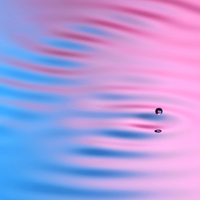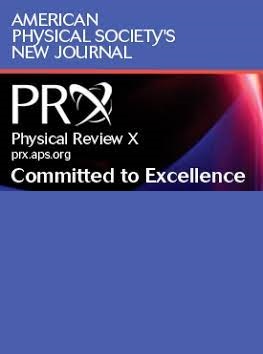Anderson Localization of Walking Droplets
IF 11.6
1区 物理与天体物理
Q1 PHYSICS, MULTIDISCIPLINARY
引用次数: 0
Abstract
Understanding the ability of particles to maneuver through disordered environments is a central problem in innumerable settings, from active matter and biology to electronics. Macroscopic particles ultimately exhibit diffusive motion when their energy exceeds the characteristic potential barrier of the random landscape. In stark contrast, wave-particle duality causes electrons in disordered media to come to rest even when the potential is weak—a remarkable phenomenon known as Anderson localization. Here, we present a hydrodynamic active system with wave-particle features, a millimetric droplet self-guided by its own wave field over a submerged random topography, whose dynamics exhibits localized statistics analogous to those of electronic systems. Consideration of an ensemble of particle trajectories reveals a suppression of diffusion when the guiding wave field extends over the disordered topography. We rationalize mechanistically the emergent statistics by virtue of the wave-mediated resonant coupling between the droplet and topography, which produces an attractive wave potential about the localization region. This hydrodynamic analog, which demonstrates how a classical particle may localize like a wave, suggests new directions for future research in various areas, including active matter, wave localization, many-body localization, and topological matter.

行走水滴的安德森定位
了解粒子在无序环境中的运动能力,是从活性物质、生物学到电子学等众多领域的核心问题。当宏观粒子的能量超过随机景观的特征势垒时,它们最终会表现出扩散运动。与此形成鲜明对比的是,波粒二象性导致无序介质中的电子即使在势能很弱的情况下也会静止--这就是著名的安德森局域化现象。在这里,我们展示了一个具有波粒特征的流体动力活动系统,即一个由自身波场在浸没的随机地形上自我引导的毫米液滴,其动力学表现出与电子系统类似的局部统计。对粒子轨迹集合的研究表明,当引导波场延伸至无序地形时,扩散会受到抑制。我们从机理上合理解释了液滴和地形之间由波介导的共振耦合所产生的统计现象,这种耦合会在局部区域产生一个有吸引力的波势。这一流体力学类似物展示了经典粒子如何像波一样局部化,为未来各领域的研究提出了新方向,包括活性物质、波局部化、多体局部化和拓扑物质。
本文章由计算机程序翻译,如有差异,请以英文原文为准。
求助全文
约1分钟内获得全文
求助全文
来源期刊

Physical Review X
PHYSICS, MULTIDISCIPLINARY-
CiteScore
24.60
自引率
1.60%
发文量
197
审稿时长
3 months
期刊介绍:
Physical Review X (PRX) stands as an exclusively online, fully open-access journal, emphasizing innovation, quality, and enduring impact in the scientific content it disseminates. Devoted to showcasing a curated selection of papers from pure, applied, and interdisciplinary physics, PRX aims to feature work with the potential to shape current and future research while leaving a lasting and profound impact in their respective fields. Encompassing the entire spectrum of physics subject areas, PRX places a special focus on groundbreaking interdisciplinary research with broad-reaching influence.
 求助内容:
求助内容: 应助结果提醒方式:
应助结果提醒方式:


